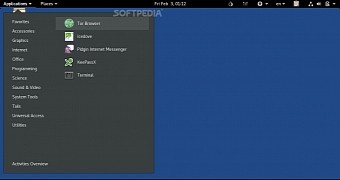The developers of the Tails GNU/Linux distribution that provides an amnesic incognito live system, also known as an anonymous live system, announced today the release of the first RC (Release Candidate) milestone towards Tails 3.0.
Tails 3.0 is expected to launch early this summer based on the highly anticipated Debian GNU/Linux 9 "Stretch" operating system. It will be the biggest release of the project sporting the upcoming TOR Browser 7.0 anonymous web browser, latest Tor 0.3.x anonymous network (client and server), and much more.
The first Release Candidate of Tails 3.0 is here to include all the latest and important security issues, as well as to upgrade the base system to the current Debian GNU/Linux 9 "Stretch" packages. It also ships with the stable Tor 0.3.0.7-1 release and Tor Browser 7.0 Alpha 4 as default web browser for anonymous browsing.
Mozilla Thunderbird replaces Icedove as default email and calendar client
Another important change implemented in today's release of Tails 3.0 RC1 is the addition of Mozilla's popular and cross-platform Thunderbird email, news and calendar client, which replaces Icedove, the open-source Thunderbird variant that shipped without any of the Mozilla trademarks.
Of course, multiple minor issues have been resolved in this first Release Candidate of Tails 3.0, and you should study the full changelog if you're curious to know what exactly was changed. In the meantime, if you're using Tails 3.0 Beta 4, you can upgrade to Tails 3.0 RC1 using the built-in package management system.
"We will provide security updates for Tails 3.0~rc1, just like we do for stable versions of Tails," reads today's announcement. "But keep in mind that this is a test image. We tested that it is not broken in obvious ways, but it might still contain undiscovered issues."
Early adopters can download the Tails 3.0 Release Candidate 1 Live ISO images for 64-bit computers right now from our website if they want to test drive the upcoming operating system and help report bugs. However, we don't recommend using this pre-release version for production use.

 14 DAY TRIAL //
14 DAY TRIAL //